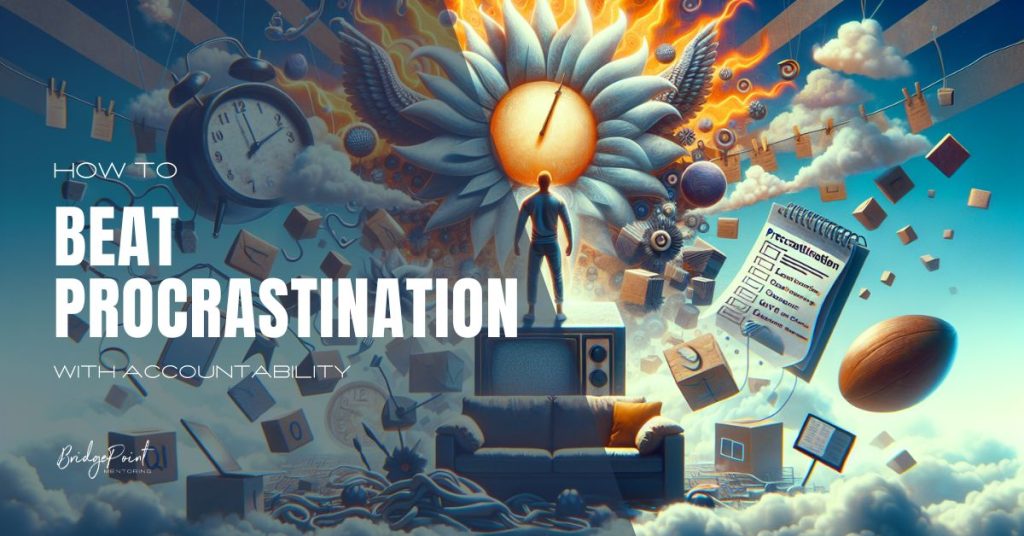Say Goodbye to Procrastination: How Accountability Can Transform Your Productivity
We’ve all been there. That nagging project sitting on our to-do list, staring at us accusingly while we find increasingly creative ways to avoid it. Procrastination is a universal human experience, but for some of us, it can become a chronic issue that seriously impacts our productivity and overall quality of life. In this article, we’ll explore the role of accountability in beating procrastination and how it can be the key to transforming your productivity.
Understanding Procrastination
Before we dive into solutions, it’s crucial to understand what procrastination really is. Contrary to popular belief, procrastination isn’t simply laziness or poor time management. It’s a complex psychological phenomenon that often stems from fear, perfectionism, or a disconnect between our present and future selves.
Procrastination can manifest in various ways:
- Putting off important tasks until the last minute
- Spending excessive time on low-priority activities
- Avoiding difficult or challenging projects
- Constantly starting new tasks without finishing old ones
Recognising these patterns in our own behaviour is the first step towards addressing the issue.
The Power of Accountability
So, how does accountability fit into all of this? Simply put, accountability is the secret weapon in the fight against procrastination. When we’re accountable to someone else, we’re much more likely to follow through on our commitments and achieve our goals.
Why Accountability Works
Accountability works for several reasons:
- External motivation: Knowing that someone else is counting on us can provide the extra push we need to get started.
- Regular check-ins: Scheduled check-ins create deadlines and milestones, breaking larger tasks into manageable chunks.
- Positive reinforcement: Sharing our progress with others provides a sense of accomplishment and encouragement.
- Objective perspective: An accountability partner can offer fresh insights and help us overcome mental blocks.
Implementing Accountability in Your Life
Now that we understand the power of accountability, how can we implement it in our own lives? Here are some strategies to consider:
1. Find an Accountability Partner
An accountability partner can be a friend, colleague, or family member who shares similar goals or understands your challenges. Regular check-ins with this person can help keep you on track and motivated.
2. Join a Support Group
Support groups, whether in-person or online, can provide a sense of community and shared accountability. Knowing that others are working towards similar goals can be incredibly motivating.
3. Use Technology
There are numerous apps and tools designed to help with accountability. From habit-tracking apps to project management software, technology can help you stay organised and accountable.
4. Hire an Accountability Coach
For those who need more structured support, working with an accountability coach can be a game-changer. An accountability coach is a professional who specialises in helping clients set and achieve their goals through regular check-ins, goal-setting exercises, and personalised strategies.
Accountability coaching can be particularly effective because:
- It provides a structured approach to goal-setting and follow-through
- Coaches are trained to identify and address the root causes of procrastination
- The financial investment can serve as additional motivation
- Coaches can offer tailored strategies based on your individual needs and challenges
The Role of Self-Accountability
While external accountability is powerful, it’s equally important to develop self-accountability. This involves:
- Setting clear, achievable goals for yourself
- Breaking larger tasks into smaller, manageable steps
- Regularly reviewing and reflecting on your progress
- Celebrating your successes, no matter how small
By combining external accountability with self-accountability, you create a robust system for beating procrastination and boosting productivity.
Overcoming Common Obstacles
Even with accountability measures in place, you may still encounter obstacles. Here are some common challenges and how to address them:
Fear of Failure
Often, procrastination is rooted in a fear of failure. An accountability partner or coach can help you reframe your perspective and focus on progress rather than perfection.
Lack of Motivation
Sometimes, we procrastinate because we’ve lost sight of why the task is important. Regularly revisiting your goals and their significance can help reignite your motivation.
Overwhelm
When tasks seem too large or complex, it’s easy to put them off. Breaking them down into smaller, manageable steps can make them feel less daunting.
The Long-Term Benefits of Accountability
Implementing accountability in your life isn’t just about beating procrastination in the short term. It can lead to lasting changes in your productivity and overall well-being:
- Increased self-discipline and self-awareness
- Improved time management skills
- Greater sense of accomplishment and self-esteem
- Reduced stress and anxiety associated with unfinished tasks
- Enhanced ability to set and achieve long-term goals
Taking the First Step
If you’re ready to say goodbye to procrastination and hello to increased productivity, accountability might be the key you’ve been looking for. Whether you choose to work with an accountability coach, find a buddy, or join a guided co-working session, taking that first step towards accountability can be transformative.
Remember, overcoming procrastination is a journey, not a destination. Be patient with yourself, celebrate your progress, and don’t be afraid to adjust your strategies as needed. With the right accountability measures in place, you’ll be amazed at what you can achieve.
As the famous saying goes, “The best time to plant a tree was 20 years ago. The second best time is now.” So why not start your journey towards beating procrastination today?
If you’re interested in learning more about the science behind procrastination and how to overcome it, check out this comprehensive guide from Verywell Mind.




